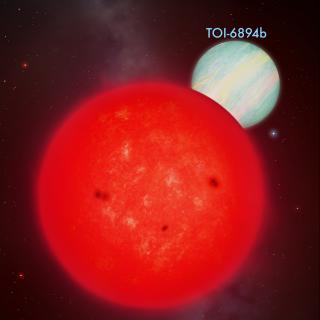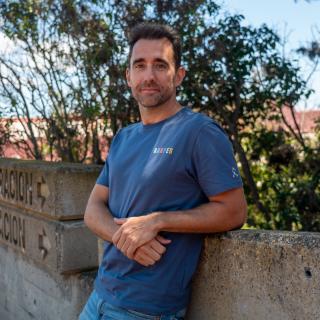It may interest you
-
 An international scientific team, including members of the Instituto de Astrofísica de Canarias (IAC), has launched an ambitious program to map exoplanets located around the Neptunian Desert —a region around stars where planets the size of Neptune are very rare— in order to better understand the mechanisms of planetary system evolution and formation. This scientific expedition has delivered its first results with the observation of the TOI-421 planetary system. Analysis of this system reveals a surprisingly inclined orbital architecture, offering new insights into the chaotic history ofAdvertised on
An international scientific team, including members of the Instituto de Astrofísica de Canarias (IAC), has launched an ambitious program to map exoplanets located around the Neptunian Desert —a region around stars where planets the size of Neptune are very rare— in order to better understand the mechanisms of planetary system evolution and formation. This scientific expedition has delivered its first results with the observation of the TOI-421 planetary system. Analysis of this system reveals a surprisingly inclined orbital architecture, offering new insights into the chaotic history ofAdvertised on -
 An international team of astronomers, including researchers from the Instituto de Astrofísica de Canarias (IAC), the University of Liège and collaborators in UK, Chile, the USA, and Europe, has discovered a transiting giant planet orbiting the smallest known star to host such a companion — a finding that defies current theories of planet formation. The host star, TOI-6894 , is a red dwarf with only 20% the mass of the Sun , typical of the most common stars in our galaxy. Until now, such low-mass stars were not thought capable of forming or retaining giant planets. But as published today inAdvertised on
An international team of astronomers, including researchers from the Instituto de Astrofísica de Canarias (IAC), the University of Liège and collaborators in UK, Chile, the USA, and Europe, has discovered a transiting giant planet orbiting the smallest known star to host such a companion — a finding that defies current theories of planet formation. The host star, TOI-6894 , is a red dwarf with only 20% the mass of the Sun , typical of the most common stars in our galaxy. Until now, such low-mass stars were not thought capable of forming or retaining giant planets. But as published today inAdvertised on -
 IAC researcher David Aguado has obtained a prestigious Starting Grant from the European Research Council (ERC), aimed at promoting promising young scientists. This is the third ERC grant -one of the most competitive and recognized of the Horizon Europe program- that the center has received so far this year, thus consolidating its international projection. These highly competitive grants provide up to €1.5 million over five years to support outstanding young scientists in establishing their own independent research groups and pursuing pioneering scientific ideas. Searching for the first starsAdvertised on
IAC researcher David Aguado has obtained a prestigious Starting Grant from the European Research Council (ERC), aimed at promoting promising young scientists. This is the third ERC grant -one of the most competitive and recognized of the Horizon Europe program- that the center has received so far this year, thus consolidating its international projection. These highly competitive grants provide up to €1.5 million over five years to support outstanding young scientists in establishing their own independent research groups and pursuing pioneering scientific ideas. Searching for the first starsAdvertised on